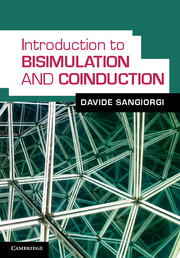Book contents
- Frontmatter
- Contents
- List of illustrations
- Preface
- General introduction
- 1 Towards bisimulation
- 2 Coinduction and the duality with induction
- 3 Algebraic properties of bisimilarity
- 4 Processes with internal activities
- 5 Other approaches to behavioural equivalences
- 6 Refinements of simulation
- 7 Basic observables
- Appendix A Solutions to selected exercises
- List of notation
- References
- Index
6 - Refinements of simulation
Published online by Cambridge University Press: 05 August 2012
- Frontmatter
- Contents
- List of illustrations
- Preface
- General introduction
- 1 Towards bisimulation
- 2 Coinduction and the duality with induction
- 3 Algebraic properties of bisimilarity
- 4 Processes with internal activities
- 5 Other approaches to behavioural equivalences
- 6 Refinements of simulation
- 7 Basic observables
- Appendix A Solutions to selected exercises
- List of notation
- References
- Index
Summary
The simulation equivalence of Exercise 1.4.17 drops the symmetry of the bisimulation game: the challenge transitions may only be launched by one of the processes in the pairs. We have seen that simulation equivalence is strictly coarser than bisimilarity. Unfortunately, it does not respect deadlock. In this section we discuss a few refinements of simulation equivalence without this drawback. They are coinductively defined, much like bisimilarity, while being coarser than bisimilarity. Thus they can allow us to use coinduction in situations where bisimilarity may be over-discriminating. Another possible advantage of a simulationlike relation is that it naturally yields a preorder (with all the advantages mentioned in Section 5.5). With respect to simulation-based relations, however, bisimilarity remains mathematically more robust and natural. The most interesting refinements we examine are represented by ready similarity and coupled similarity.
We begin in Section 6.1 with complete simulation, and continue in Section 6.2 with ready simulation. They are to simulation what complete trace equivalence and failure (or ready) equivalence are to trace equivalence. In Section 6.3 we discuss two-nested simulation equivalence. In Section 6.4 we consider the weak versions of the relations in the previous sections. In Section 6.5 we present coupled similarity, which aims at relaxing the bisimulation requirements on the internal actions of processes. Finally, in Section 6.6, we summarise the various equivalences discussed in this and previous chapters.
Complete simulation
The arguments about the deadlock-insensitivity of trace equivalence in Section 1.3.2, such as the equality between the processes in Figure 1.4, apply to simulation equivalence too.
- Type
- Chapter
- Information
- Introduction to Bisimulation and Coinduction , pp. 168 - 181Publisher: Cambridge University PressPrint publication year: 2011



